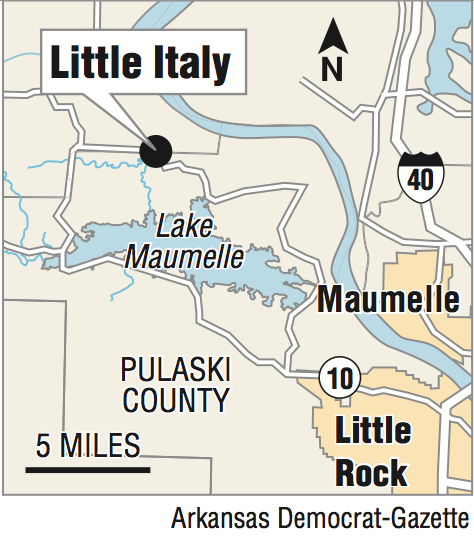The final hearing on the proposed incorporation of Little Italy as the state's 502nd town concluded Wednesday with no ruling from County Judge Barry Hyde.
Pulaski County's attorney said after the hourlong hearing that Hyde couldn't say when he expects to announce a decision because he's barred from discussing the case under judicial ethics laws.
Wednesday's hearing was the continuation of one in December, when the judge had to cut the session short so he could catch a flight to a conference in Boston.
Chairmen of the Little Italy Incorporation Task Force -- Kristy Eanes and Chris Dorer -- took about 30 minutes Wednesday to finish their presentation on why the area should be allowed to become its own town. A few people then told the county judge why they opposed the effort.
Supporters recapped their position and previous statements, saying the community could take better care of its roads and better preserve the area's 100-year history if it were its own municipality. The community is most notably known for its wine production.
Dorer's presentation showed that the proposed town could repave six of its roads if it were to receive one of the $250,000 grants given to municipalities by the state Highway and Transportation Department. There also has been discussion of turning some private dirt roads in the area into city-maintained streets if a town is formed.
Little Italy is an 8.8-square-mile community in far northwest Pulaski County. There are six county-maintained roads in the defined area.
Three residents of Little Italy or nearby areas spoke against incorporation Wednesday. One man said he didn't think the proposed town would have the money to maintain roads better than the county does.
Central Arkansas Water also opposes the incorporation effort. The water utility was a central player in lobbying for the county's Lake Maumelle watershed zoning code, designed to protect the drinking water of about 400,000 people that the utility serves.
The proposed borders for Little Italy encompass about 25 percent of Pulaski County's share of the protected watershed. The watershed -- land that drains into the lake -- encompasses 137 square miles in Pulaski, Saline and Perry counties.
Eanes repeated Wednesday earlier statements that the incorporation task force supported the watershed zoning code and would lobby any future city council to adopt the code, but that didn't put an end to Central Arkansas Water's concerns.
Many property owners have been outspoken against the zoning code, and the water utility isn't reassured that a city council made up of that electorate would adopt the zoning code as an ordinance, utility spokesman John Tynan said.
The county judge asked whether anything would change the utility's view.
"Let me ask you a question that you don't have to answer," Hyde said to Tynan. "If there was a way to express their commitment and desire to adopt the watershed ordinance as it's written presently, and there was a way to bind them to that through the legal system, would y'all withdraw your opposition?"
Tynan said the utility has researched that matter and found that the only binding way to do that is to have individual property owners agree to the zoning code in signed covenants that would stay with the land in perpetuity.
"The only situation we would be comfortable with is if 75 percent of parcel owners out there signed a restrictive covenant," Tynan said.
There are 329 qualified voters within the proposed boundaries. About 220, or 67 percent, of them signed a petition to become a town. But the 220 people collectively own only about 28 percent of the property in the defined area, Tynan said.
The Little Italy Incorporation Task Force is proposing a $120,000 annual budget for the town, with no tax increases. The town would contract with the Pulaski County sheriff's office for police protection and hire a part-time town marshal for $10,000, according to the task force's plan.
The area would continue to be served by two volunteer fire departments. The idea is that the town could allocate money to update the departments' equipment so they could better serve the area, Dorer and Eanes said in the presentation.
"There is an energy and excitement in Little Italy at the prospect of becoming a town with all the opportunities it would afford us," Eanes said.
Little Italy residents also hope to increase tourism and interest in the area's history.
"December 23, 1915, on Christmas Eve's eve, just over 100 years ago, a group of Italian immigrants chose Arkansas out of all the states to be their home," Eanes said, taking a break to hold back tears. "My great-grandfather Joseph Belotti was one of those Italians and a founder of Alta Villa, now known as Little Italy."
"Those of us in this room, the residents and descendants, would like to finish what he started, and other residents as well. We have dreams now of our own, and Little Italy is the center of hope and opportunity for us."
Metro on 01/14/2016

